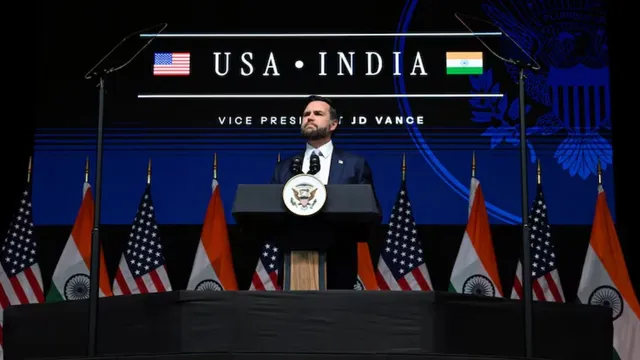- By Supratik Das
- Mon, 25 Aug 2025 08:36 AM (IST)
- Source:JND
United States Vice President JD Vance has defended President Donald Trump’s decision to impose steep 50 per cent tariffs on Indian imports, arguing that the measure is part of Washington’s strategy to cut off Russia’s oil revenues and push for an end to the Ukraine war. Though New Delhi, has repeatedly criticised , insisting its oil purchases from Moscow are based on national interest and not up for negotiation.
Speaking on NBC’s Meet the Press, Vance described the tariffs on India as an example of the Trump administration’s “aggressive economic leverage.” According to him, the aim is to “make it harder for the Russians to get rich from their oil economy” and thereby reduce Moscow’s ability to finance its war in Ukraine. “We believe we’ve already seen some significant concessions from both sides, just in the last few weeks,” Vance said, expressing optimism that Washington could broker peace. He further noted that Russia could be “reinvited into the world economy if they stop the killing,” but warned that continued aggression would ensure prolonged isolation.
The US decision marks one of the most direct trade measures against a close partner over the Ukraine conflict. Earlier this month, Trump announced additional tariffs on Indian goods, raising duties to 50 per cent, including a punitive 25 per cent hike specifically tied to India’s Russian crude oil imports.
🇺🇸🇷🇺 JD VANCE: TRUMP IS PUTTING RUSSIA UNDER MAX ECONOMIC PRESSURE
— Mario Nawfal (@MarioNawfal) August 24, 2025
"The president has applied aggressive economic leverage, for example, the secondary tariffs on India, to try to make it harder for Russians to get rich from their oil economy.
He's tried to make it clear that… https://t.co/6b01gHiOhu pic.twitter.com/T8j8KIRPZV
India Pushes Back Against US Move
India has firmly criticised Washington’s move, underscoring that its energy choices are guided by market dynamics and national priorities. External Affairs Minister S. Jaishankar strongly dismissed US objections. While speaking at an international forum, he underlined that India will continue to safeguard both its economic independence and its strategic autonomy, even in the face of American pressure. “When it comes to trade, when it comes to the interests of farmers, when it comes to our strategic autonomy, and when it comes to opposition to mediation, this government is very clear. Our positions are firm. If anybody disagrees, please tell the people of India that you do not value their farmers or their autonomy. We do,” Jaishankar said.
ALSO READ: India, Russia Eye BIG Payment Plan As Trump’s Tariff War Escalates: Here's What You Need To Know
Prime Minister Narendra Modi echoed the same in his Independence Day address, too, addressed the issue in his Independence Day speech, making clear that tariffs would not alter India’s stance. From the Red Fort, he pledged that the government would protect the interests of farmers, fishermen, and small industries impacted by Washington’s decision. Without directly naming the United States, PMModi said his government is ready to “pay the price” for standing firm on national priorities. “Farmers, fishermen, and cattle rearers are our top priorities. Modi will stand like a wall against any policy that threatens their interests. India will never compromise when it comes to protecting the interests of our farmers,” he said from the Red Fort.
Trump’s tariff strategy has also sparked controversies in Washington. Democratic lawmakers criticised the move, arguing that penalising India would not deter President Vladimir Putin. Even some Republicans, including former UN Ambassador Nikki Haley, have urged caution, warning that straining ties with New Delhi could undermine efforts to counter China in the Indo-Pacific.
The escalation highlights the growing friction between two longtime partners at a time when global oil markets remain volatile. While the Trump administration insists that economic pressure on India is essential to weaken Moscow, New Delhi has made clear that it will not back down from buying Russian crude at discounted rates. How the two sides navigate this standoff, balancing America’s sanctions regime with India’s quest for energy security and strategic autonomy, may shape the future of US-India relations in the upcoming years.

